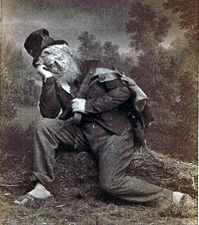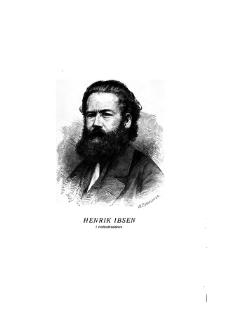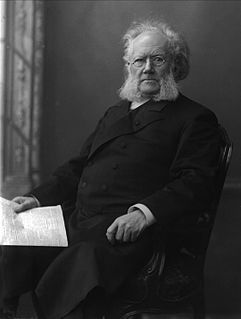
A Doll's House is a three-act play written by Norway's Henrik Ibsen. It premiered at the Royal Theatre in Copenhagen, Denmark, on 21 December 1879, having been published earlier that month. The play is set in a Norwegian town circa 1879.

Peter Handke is an Austrian novelist, playwright and translator.
This article presents lists of the literary events and publications in 1891.
This article presents lists of the literary events and publications in 1879.

Peer Gynt is a five-act play in verse by the Norwegian dramatist Henrik Ibsen published in 1867. Written in Danish—the common written language of Denmark and Norway in Ibsen's lifetime—it is one of the most widely performed Norwegian plays. Ibsen believed Per Gynt, the Norwegian fairy tale on which the play is loosely based, to be rooted in fact, and several of the characters are modelled after Ibsen's own family, notably his parents Knud Ibsen and Marichen Altenburg. He was also generally inspired by Peter Christen Asbjørnsen's collection of Norwegian fairy tales, published in 1845.
Charles Harold Herford was an English literary scholar and critic. He is remembered principally for his biography and edition of the works of Ben Jonson in 11 volumes. This major scholarly project was published from 1925 onwards by Oxford University Press, and completed with Percy and Evelyn Simpson. It took half a century, being agreed on in 1902.

Love's Comedy is a comedy by Henrik Ibsen. It was first published on 31 December 1862. As a result of being branded an "immoral" work in the press, the Christiania Theatre would not dare to stage it at first. "The play aroused a storm of hostility," Ibsen wrote in its preface three years later, "more violent and more widespread than most books could boast of having evoked in a community the vast majority of whose members commonly regard matters of literature as being of small concern." The only person who approved of it at the time, Ibsen later said, was his wife. He revised the play in 1866, in preparation for its publication "as a Christmas book," as he put it. His decision to make it more appealing to Danish readers by removing many of its specifically Norwegian words has been taken as an early instance of the expression of his contempt for the contemporary Norwegian campaign to purge the language of its foreign influences.
The Pillars of Society is an 1877 play written by Norwegian playwright Henrik Ibsen.
The Vikings at Helgeland is Henrik Ibsen's seventh play. It was written during 1857 and first performed at Christiania Norske Theater in Oslo on 24 November 1858. The plot takes place during the time of Erik Blood-axe in the north of Norway in historic Helgeland, a time in which Norwegian society was adjusting from the tradition of Old Norse Sagas to the new era of Christianity. It concerns the arrival of Ornulf, who with his seven sons is seeking his daughter, Dagny, and foster-daughter, Hjordis, who were abducted and married by Sigurd and Gunnar, respectively. Tragedy compounded by conceptions of honour and duty lead to the deaths of all of Ornulf's sons, Sigurd, and Hjordis. The plot is reminiscent of the Germanic myth of Sigmund and Brynhilde.
Catiline or Catilina was Henrik Ibsen's first play. It was written during winter 1848–49 and first performed under Ibsen's name on 3 December 1881 at the Nya Teatern, Stockholm, Sweden. The first performance of Catilina in Norway not under Ibsen's pseudonym was at Det Nye Teater in Oslo on 24 August 1935.
Nationality words link to articles with information on the nation's poetry or literature.

Suzannah Ibsen was a Norwegian woman who was the wife of playwright and poet Henrik Ibsen and mother of noted politician Sigurd Ibsen.

Norsk biografisk leksikon is the largest Norwegian biographical encyclopedia.
John Richard Northam was a professor emeritus of literature and drama, ranked among the foremost Ibsen scholars in the world.

Cecilie Løveid is a Norwegian novelist, poet, playwright, and writer of children's books.

The Oxford Ibsen is a book series containing the most comprehensive English translations of the playwright Henrik Ibsen's collected works, edited by James Walter McFarlane and published between 1960 and 1977. It is an important edition as the releases of Ibsen's plays usually are translated into third languages through The Oxford Ibsen, rather than from the original Norwegian source texts. It also contains some drafts and preparations, and each play has a foreword that informs about first performances on stage, interpretation and reception. The Oxford series is still missing some of Ibsen's articles, reviews, speeches, correspondence, and poetry.
The Ibsen Year was the Norwegian government's official celebration of Henrik Ibsen in 2006, marking the 100th anniversary of his death. The Ibsen Year included cultural events in multiple countries, including an opening ceremony in Oslo attended by the royal family and international guests, television programs, cultural events in Italy, Germany, the United Kingdom, the United States, China and other countries, and an International Gala performance at the Great Pyramid of Giza in Egypt, hosted by the country's First Lady Suzanne Mubarak and also attended by Queen Sonja. The Ibsen Year's artistic director was Bentein Baardson and the producer was Nora Ibsen. The chairman of the supervisory committee was former Norwegian Minister of Culture Lars Roar Langslet. The planning committee of the Ibsen Year had a core budget of around 70 million NOK, not counting TV productions and various other costs.
Elena Farago was a Romanian poet and children's author. She also translated works by Ibsen, Nietzsche, Maeterlinck and many others into Romanian.









